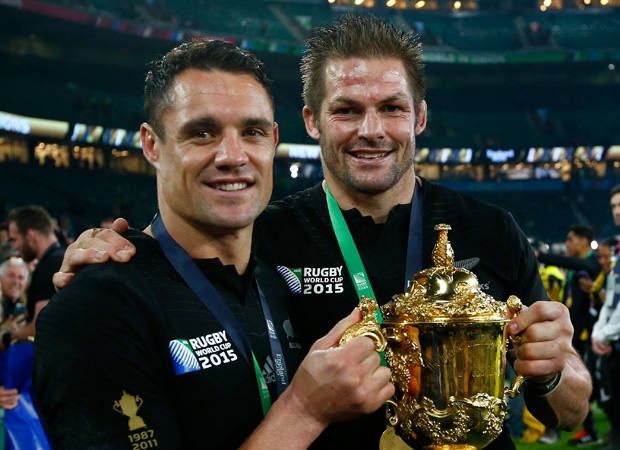
Former All Black flyhalf, Dan Carter, has penned a heartfelt letter to his legion of fans all over the world.
Carter, who retired from all rugby on Saturday, started off by reminiscing about his early rugby memories, including New Zealand triumph at the inaugural Rugby World Cup in 1987.
“I suppose it really started when I was five years old, and New Zealand co-hosted the first-ever Rugby World Cup,” said Carter in the letter which appeared on The Players Tribune website.
Carter said that John Kirwan’s try against Italy, which still gets replayed to this day, was the catalyst that began his love of the game.
“And it was during that game (an All Blacks win, naturally) that John Kirwan scored one of the greatest tries I’ve ever seen. He took a kickoff and, with a full head of steam, ran the length of field, weaving through Italy’s entire team, dodging tackle after tackle, until he finally dove across the line to score. Man, that play just lit a fire inside me — I still get tingles just thinking about it,” Carter continued.
“As soon as that match was over, I was in my front yard trying to mimic all the same moves he’d made on that play. Now, I was just a little kid, the ball was almost as big as I was, but in my mind I was JK. I was sprinting full speed, weaving through tacklers, and I was wearing that iconic jersey as I touched the ball down for the try and the imaginary crowd lost its mind,” he said.
Carter played 112 Tests for New Zealand scoring a record 1 598 points during his international career
He was named world player of the year in 2005, 2012 and 2015.
Carter lifted the World Cup in 2011 and again in 2015, before retiring from Test rugby.
Read his full letter below.
“Before I was anything, I was a rugby fan.
I suppose it really started when I was five years old, and New Zealand co-hosted the first-ever Rugby World Cup.
This was 1987, and while I have so many memories from around that age that are blurry, that tournament is still crystal clear in my mind.
The All Blacks played the very first match of the tournament against Italy in Auckland. And it was during that game (an All Blacks win, naturally) that John Kirwan scored one of the greatest tries I’ve ever seen. He took a kickoff and, with a full head of steam, ran the length of field, weaving through Italy’s entire team, dodging tackle after tackle, until he finally dove across the line to score. Man, that play just lit a fire inside me — I still get tingles just thinking about it.
As soon as that match was over, I was in my front yard trying to mimic all the same moves he’d made on that play. Now, I was just a little kid, the ball was almost as big as I was, but in my mind I was JK. I was sprinting full speed, weaving through tacklers, and I was wearing that iconic jersey as I touched the ball down for the try and the imaginary crowd lost its mind.
New Zealand ended up winning the entire tournament, and I still remember the moment when David Kirk, the team captain, hoisted the trophy in the air. It cemented one thought in my mind. It wasn’t actually a thought so much as it was a dream — a wild one at that.
I wanted that to be me one day.
I wanted to be an All Black. I wanted to represent my country — even if it was just for one cap.
I was really young, but at that moment I had zero doubts as to what I wanted in my life. And I knew I would be willing to do whatever it took — to make whatever sacrifices I needed to — in order to get it.
It seemed an impossible dream at the time because I was from a town of about 700 people. But that didn’t really phase me because all that drove me was my passion for the game and sport in general. Growing up, my room was covered from floor to ceiling with posters of athletes I idolized — rugby players, cricketers, basketballers. If I wasn’t outside playing sports, I was inside daydreaming about them.
But more than anything, I loved rugby.
I went to every game I could get a ticket to, trained constantly, and I definitely hounded my favorite players for an autograph and “just one photo.” I definitely know what it’s like to wish you could just be in the vicinity of a player you idolized, and maybe, just maybe, work up the courage to interact with them. I experienced that feeling for so many of the players I watched growing up — some of whom I was blessed enough to play with later.
And that’s why, as I get ready for a new chapter in my life, it only felt right to say something to you, the fans — because you really are what’s made this journey so special, and why I’ve stuck with it as long as I have.
Back in 2002, I was 20 years old and hadn’t signed a professional contract yet.
I was playing provincial rugby and working a few part-time jobs on the side while living in a filthy flat with a whole bunch of mates who attended a uni nearby. I still had ambitions of playing professionally, but back then my more immediate focus was on just being able to afford rent.
One day, when I was walking down Oxford Terrace in Christchurch, I was stopped by this man. He said hello, and then just started talking to me like we knew each other pretty well. He was a really nice guy. We were just talking rugby, and he was really curious about my opinions and just seemed to know a lot about me. So, the entire time we spoke I just kept trying to place where we must have met before. Maybe an old teacher? Is this guy a friend of my dad’s?
We ended up talking on the side of the road for about 20 minutes (which is pretty brief as rugby discussions go). As soon as we said goodbye and I turned around, I started jogging through my mind trying to think of who he could have been — but I just couldn’t come up with a name.
And then it finally hit me — that this man wasn’t actually anybody I knew at all. He was just someone who had seen me play that weekend. I’m not going to lie, part of me thought — on a basic human level — Man, O.K., that was kind of weird.
I’d just spent 20 minutes on the side of the road talking with a random pedestrian who I’d pretended to know in order to be polite.
But then I realized the flip side of that. This man had taken 20 minutes out of his day to be kind and make conversation with me all because he enjoyed watching me play the game I love. And I realized that the reason it felt like we knew each other was because of the passion we shared for the same thing — rugby.
This is a sport that spans so many different continents and cultures, but there’s a special connection between fans everywhere. It’s a peculiar thing, this game where you can be absolutely brutal on the field for 80 minutes, and then afterwards, it’s all behind you. There are plenty of sports where opposing fans need to be separated from each other in different sections, but that’s not the case for rugby. You go at it as hard as you can as a player and as a supporter, and as soon as the final whistle blows, there’s no animosity toward the opposing side — just a desire to grab a beer with them.
It was surreal as my career progressed and more and more fans started taking an interest in my form. I learned a lot about the power of sport, and how much a game and result can really impact others.
When I started getting my first fan letters, I made a point to try to respond to every single one. The wins always felt that much more special because I knew I was making so many people happy. And losses hurt that much worse because I truly was invested in not wanting to disappoint those who supported my side. But more than anything, I always appreciated the fact so many fans invested their emotions in my performance.
There are many things that people struggle with in life that they can’t control. We all deal with our own battles that take up a lot of our headspace. But knowing that, for 80 minutes, people could watch me play a game and completely take their mind off the stresses of life — that was special to me.
The greatest example of that I experienced was in 2011, when we had a huge earthquake in Christchurch. Our fans and community were hit really hard, and for many people, rugby became a way to briefly escape the trauma that they were going through. I’ve never been on a team that played harder than we did — all because we wanted to give those people who were suffering something to cheer and feel positive about.
With the rise of social media, it became much easier to interact directly with fans. So as my career went on, I didn’t get as much fan mail as I used to. But there was still one fan of mine from Japan who never stopped sending me letters. She attended my matches all over the world, and kept track of the results, and thought enough to continue writing to me about them.
So to Yuka — and every other fan who’s taken the time to reach out — thank you. Truly.”








